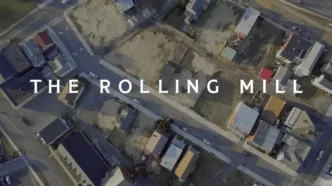‘The Rolling Mill’ (2017) — Dillon M Hayes’ gripping documentary short film. A raw look into industrial life. Watch now for an eye-opening experience.
🏭 The Rolling Mill (2017) — Documentary Short Film by Dillon M. Hayes
A bittersweet portrait of a small American city caught between nostalgia and necessity, The Rolling Mill takes us to Cumberland, Maryland — a place where the American Dream still flickers in the windows of modest homes, even as the world outside moves on. Directed by Dillon M. Hayes, this 15‑minute documentary captures a community at a crossroads, where love for home collides with the push for change.
🧭 Overview
- Genre: Documentary / Social Commentary
- Director: Dillon M. Hayes 🎬
- Cinematography: Hayden Mason 🎥
- Co‑Editor: Nico Bovat ✂️
- Runtime: ~15 minutes
- Country: United States 🇺🇸
- Language: English
- Premiere & Recognition:
- Vimeo Staff Pick 🌟
- Featured on Short of the Week
- Setting: Cumberland, Maryland — a once‑thriving industrial town now facing economic decline
Watch full short:
- Director: Dillon M. Hayes
- Cinematographer: Hayden Mason
- Editor: Nico Bovat
- Additional Editing: Dillon M. Hayes
- Aerial Photography: Joe Bagatti
- Composer: Coupler as Ryan Norris
- Sound Mix: Matt Whitson
- Titles: Noah Atkinson
- Colorist: Carol Camp
📖 Story in Brief
The film follows 12 homeowners in Cumberland’s Rolling Mill neighborhood, along with the city’s mayor, as they navigate a controversial redevelopment plan.
- The Proposal: The city wants to buy and demolish dozens of homes to make way for new businesses and infrastructure — a bid to “revive” the area.
- The Resistance: Many residents, some of whom have lived there for generations, refuse to sell. Their houses aren’t just property; they’re memory‑filled anchors.
- The Tension: The mayor insists the plan is for the greater good. The homeowners see it as erasure.
- The Heart: Hayes gives each voice space — no villains, just people with different visions for the same place they love.
🎨 Creative DNA & Style
- Balanced storytelling: Hayes resists easy narratives, showing empathy for both sides.
- Visual poetry: Shots of weathered porches, quiet streets, and the surrounding Appalachian hills give Cumberland a rugged beauty.
- Hypnotic score: The music underscores the film’s melancholy without drowning it in sentiment.
- Pacing: Measured and contemplative, mirroring the slow churn of change in small towns.
🌟 Themes & Resonance
- The American Dream: What it means to “make it” — and keep it — in a changing economy.
- Home as identity: A house isn’t just walls; it’s history, pride, and belonging.
- Progress vs. preservation: The eternal tug‑of‑war in redevelopment debates.
- Community bonds: Even in disagreement, there’s shared love for the place.
✅ Pros & ❌ Cons
Pros
- 🎯 Nuanced perspective: No oversimplified heroes or villains.
- 🎥 Cinematic intimacy: Makes Cumberland feel personal, even if you’ve never been there.
- 💬 Conversation starter: Sparks dialogue about urban renewal and displacement.
Cons
- ⏳ Short runtime: Leaves you wanting more depth on individual stories.
- 🌀 Quiet tone: Those seeking high drama may find it subdued — though that’s part of its authenticity.
💡 Humanized Takeaway
The Rolling Mill 2017 short film is a love letter to a place and its people, but it’s also a mirror for countless communities facing the same question: When the world changes around you, do you hold on — or let go? Hayes doesn’t give easy answers. Instead, he leaves us with the image of a neighborhood in limbo, its residents still tending gardens, still waving to neighbors, still believing in their own version of the American Dream.
🔍 Find More & Watch
- Short of the Week feature on The Rolling Mill — full review and streaming link.
- Dillon M. Hayes’ official page — director’s portfolio and project notes.
- Mountainfilm profile — festival background and filmmaker bio.

